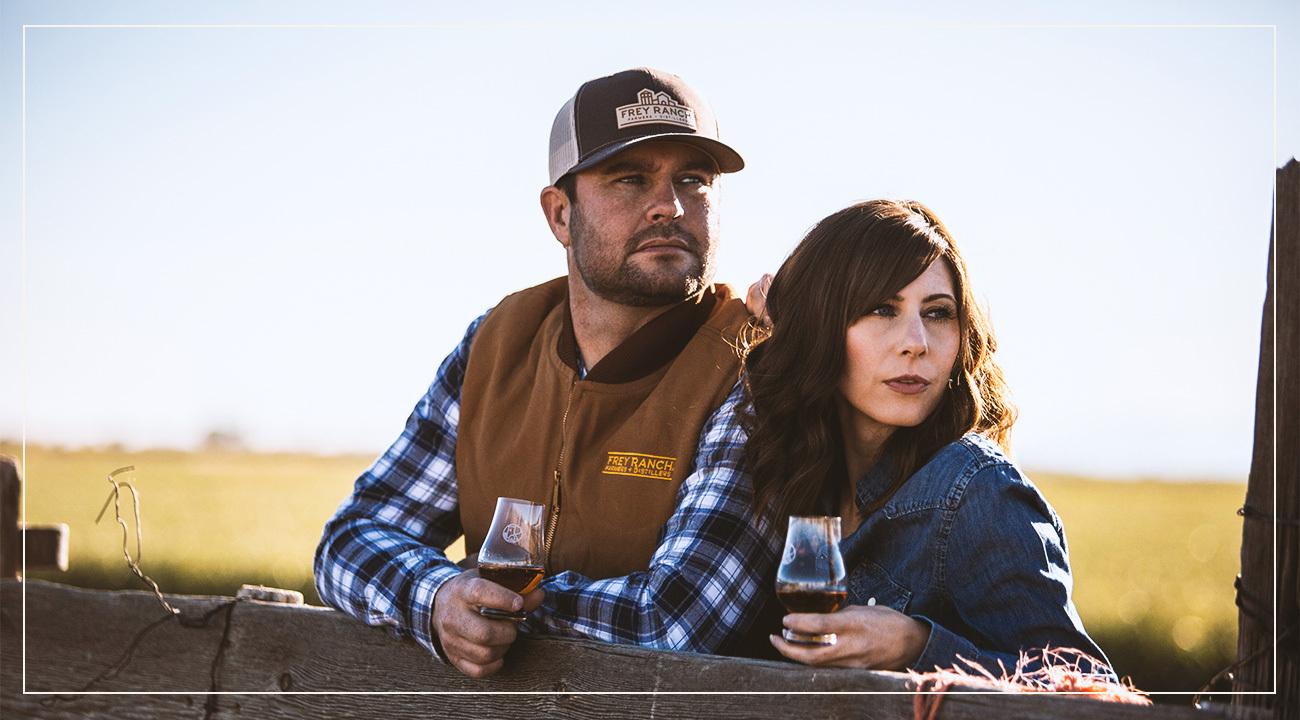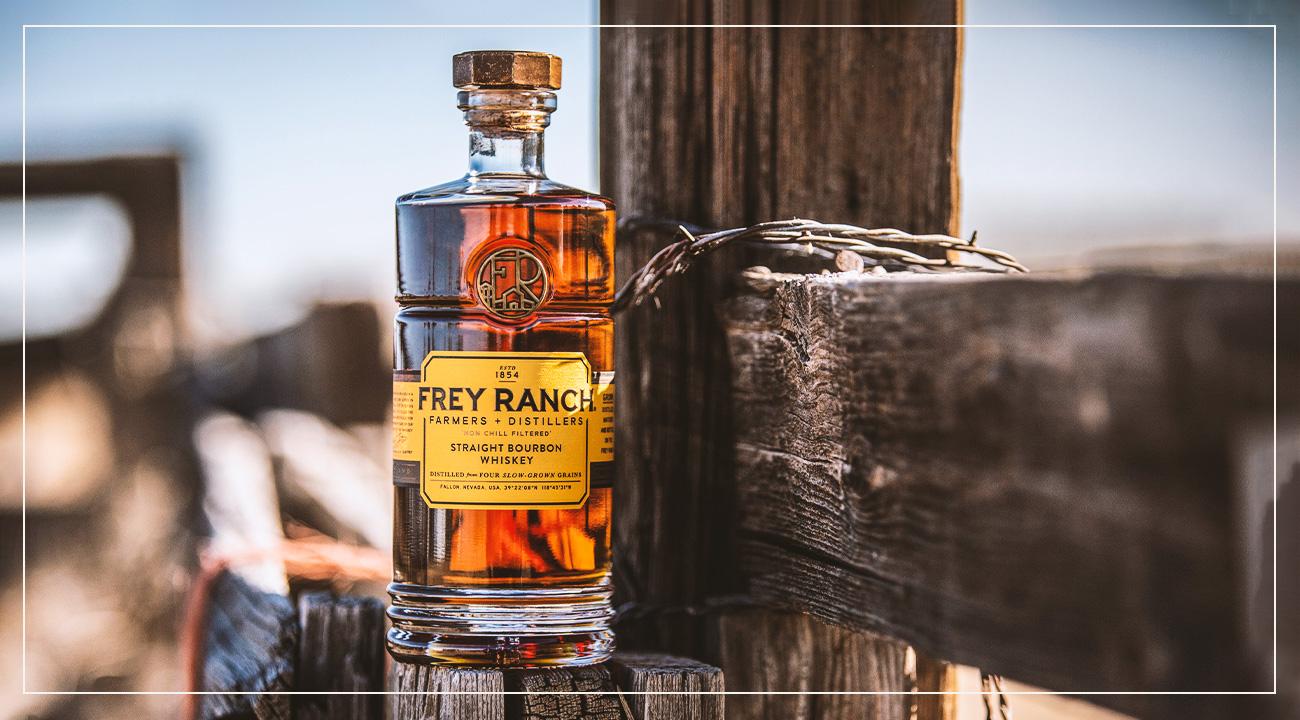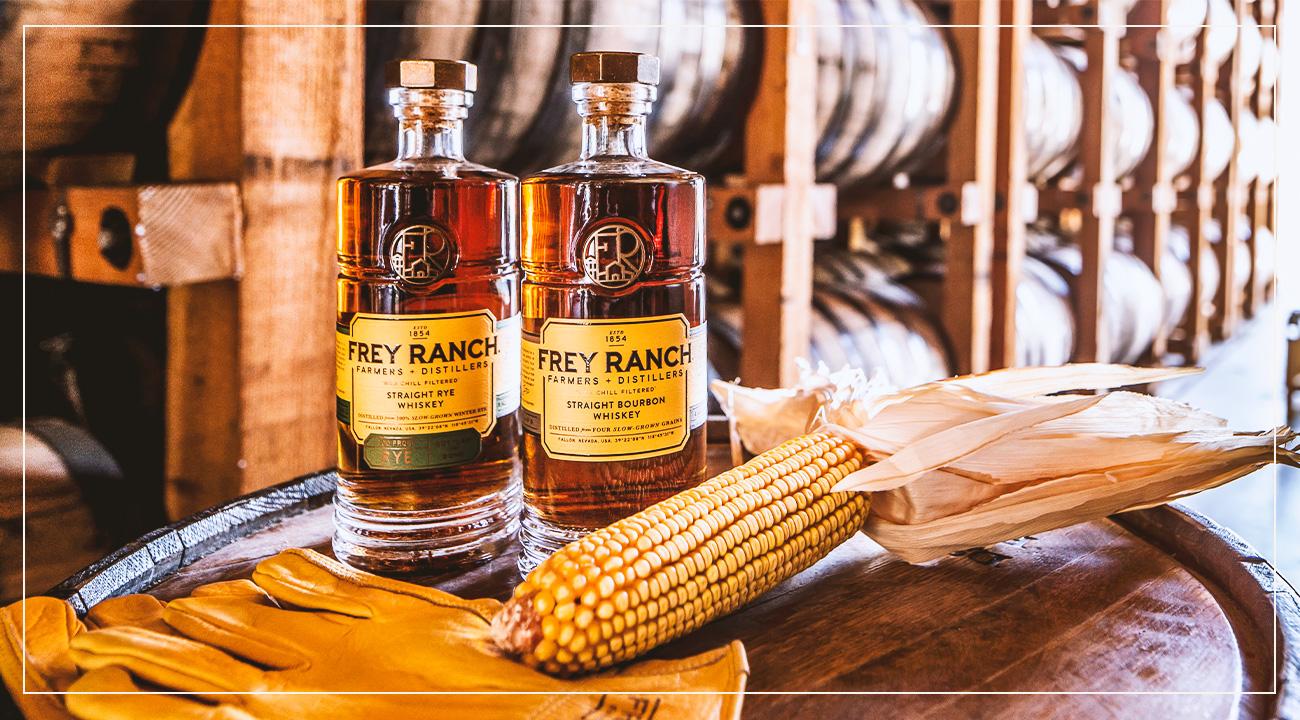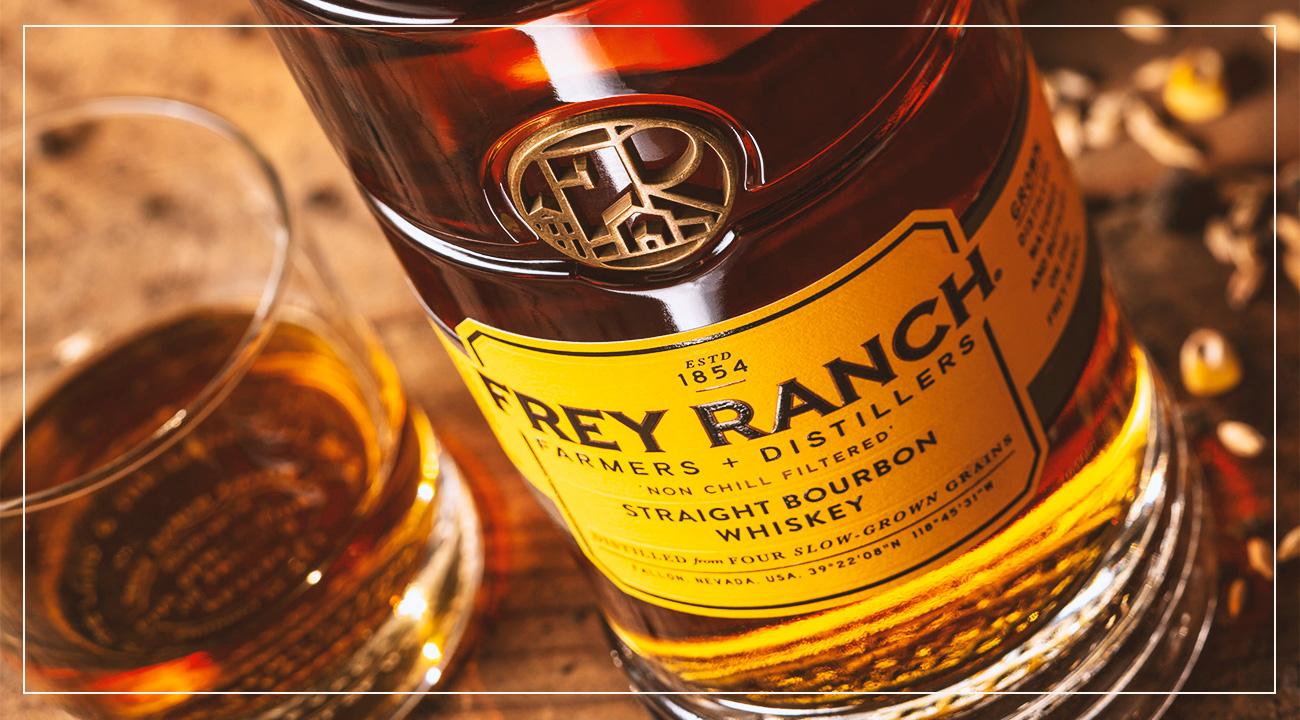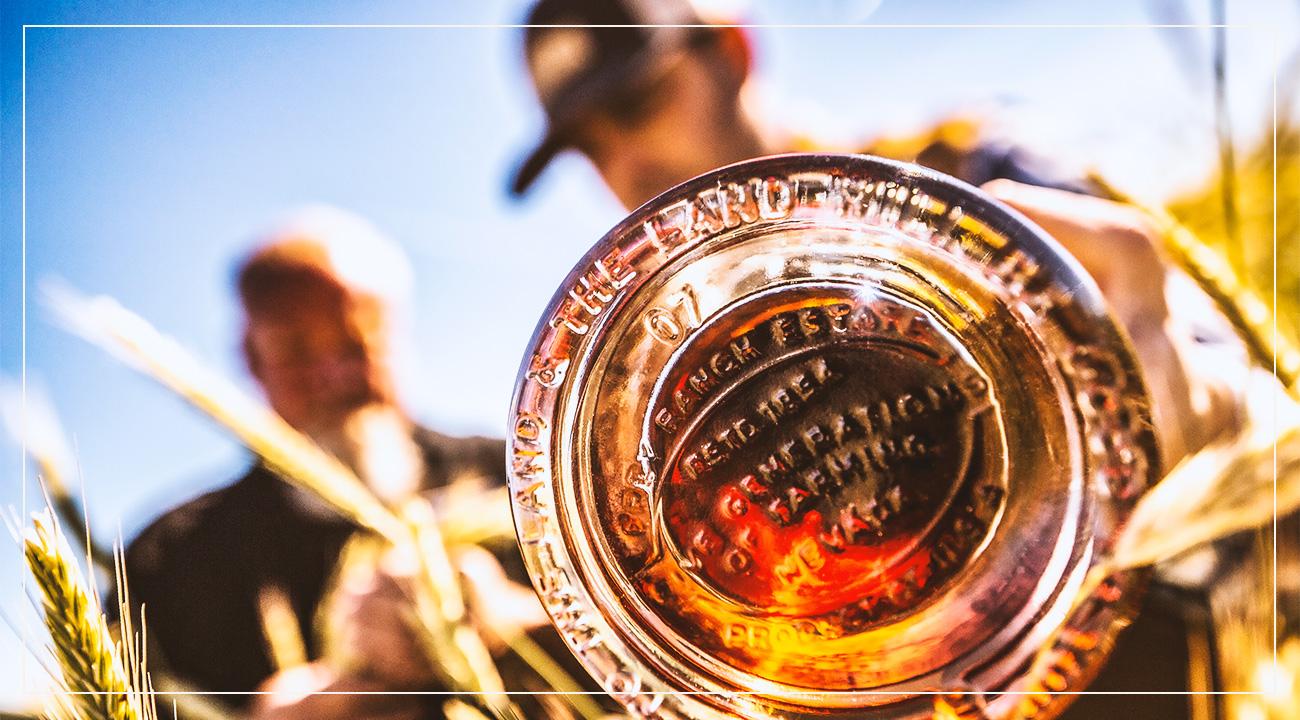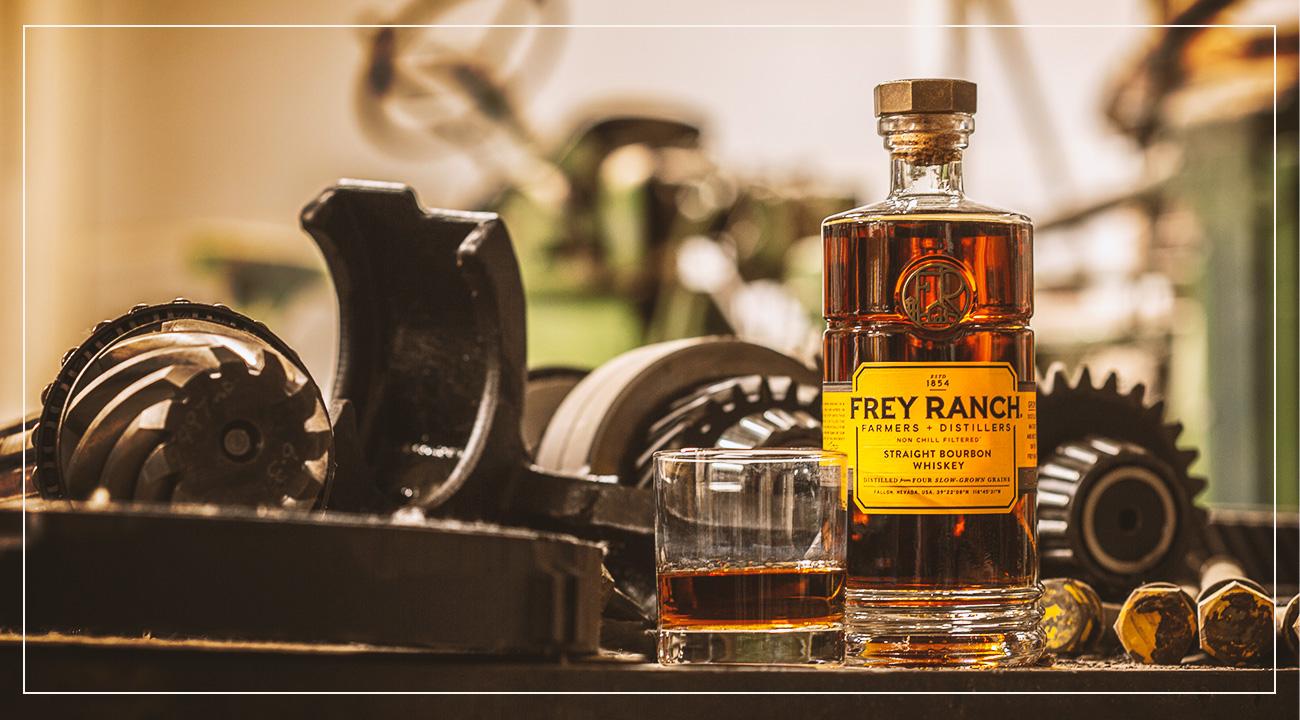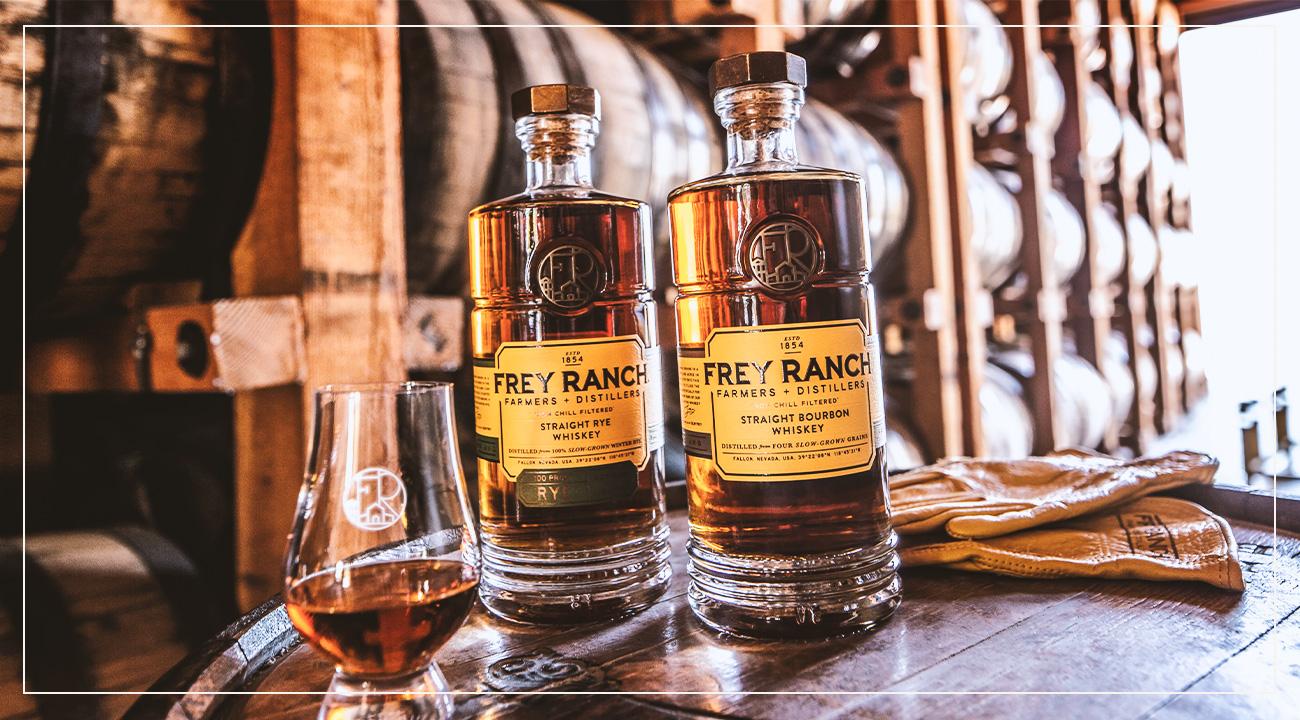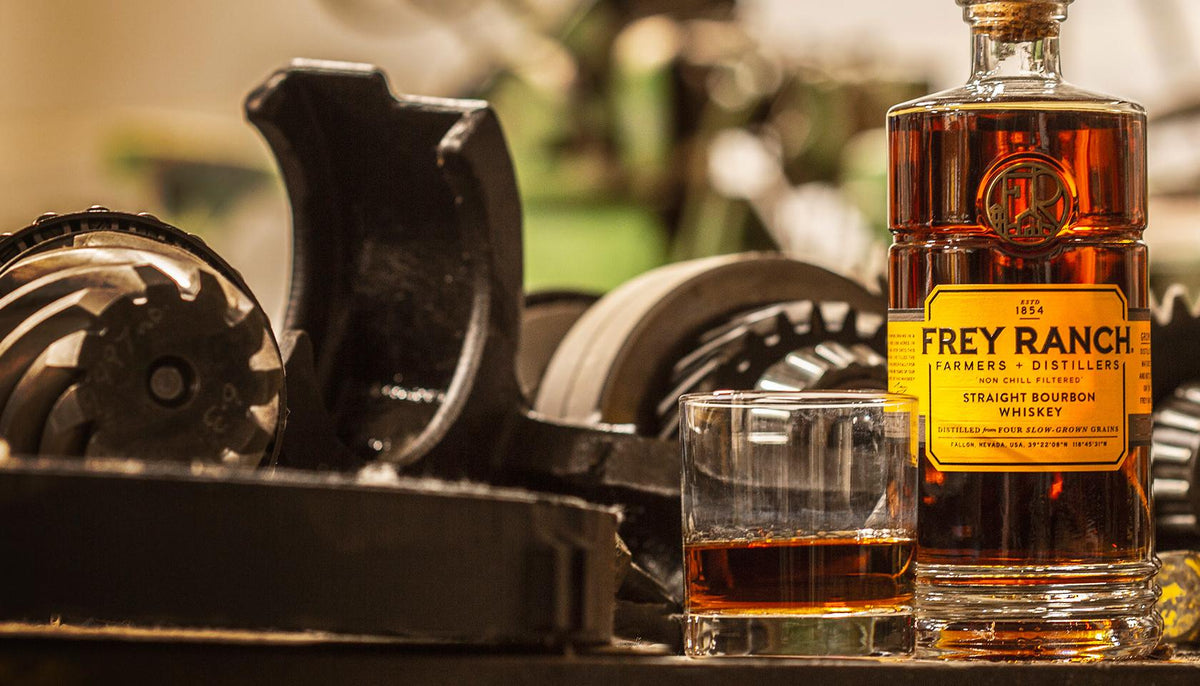
Uncovering the Secrets of Whiskey Grains with Colby & Ashley Frey
|
|
Time to read 11 min

|
|
Time to read 11 min
Colby and Ashley Frey come from a family ranch just east of the Sierra Nevada Mountains with over 165 years of tradition in farming. In 2014, they founded Frey Ranch Distillery – or as Colby describes it, “Whiskey Farm”.
They combine the old-world know-how of growing high-quality sustainable grains and producing premium Bourbon with modern technology such as lasers and GPS-guided leveling systems. Their slow-grown grains, 100% grown on-site, are specifically farmed to be turned into a delightful non-chill filtered 90 Proof Bourbon.
We sat down with them to chat about the Spirit, the passion, and the art of distillation.
Colby: So my family's been farming in Nevada since 1854. Nevada didn't even become a state until 1864; 10 years later, we've been continually farming ever since. I always wanted to be a farmer.
We're in this ideal area where we can grow high-quality wheat, rye, barley, and corn. That's in all of our Whiskies and grown right here on the farm. We also grow first-rate alfalfa that we're exporting to China, Dubai, Japan, Taiwan - all over the world.
I'd always loved Whiskey and thought, what better way to really showcase our crops and allow us to grow and vertically integrate than to make it into Whiskey. So we're kind of combining the love of agriculture with the love of Whiskey. And I get to do with my love Ashley. So I'm really fortunate.
By growing our own grains, we can ensure that they're grown the right way. We often sacrifice quantity for quality. By understanding the distilling and agriculture sides, we bridge that gap because there's often a kind of a missing link. We can get the better quality which ends up showing in the bottle.
If you could have one superpower, what would it be?
Ashley: I'd say time travel just because it was really scary to invest the money in laying down the Bourbon. We didn't want to release anything that was less than four years old. But looking back, I would put more Bourbon in barrels.
Colby: I think I'd like to fly. I have a pilot's license, and I think that'd be cool.
How would you describe Frey Ranch in three words?
Colby: Farm, grain, and distilling.
Ashley: I would say innovation, terroir, and inspiring
What is your favorite music and what drink goes with it?
Colby: It varies a lot, but I tend to listen to country music lately. It's relaxing when you're sitting on a tractor for long periods; it's easy listening. I could pair Whiskey with anything, so I'd pair it with a neat glass of Bourbon.
Ashley: This will be super boring because I would also pick country music, especially if it's a Whiskey Song. And I like to drink our Single Barrel. Neat.
What would you eat and drink for your last supper?
Colby: I would drink Whiskey, but I think I'd have a big steak. I like a nice fillet.
Ashley: I probably do pizza and beer, just because that's kind of what I was craving last night for dinner—just a pepperoni pizza.
Assuming Frey Ranch is your favorite, what's your second favorite Bourbon or Whiskey?
Colby: I like Wilderness Trail. We met Dr. Pat a few times, and he's a great person. I like their products for being fat and fabulous, and I also like his story, where he's a son of a farmer. I feel a deep connection: he's very similar in his story and passion.
Ashley: I would say Milam & Greene out of Texas because Heather Greene is another amazing woman in Whiskey. I've had the opportunity to meet her a couple of times. She's got a great palate, and it's very inspirational to blend her Whiskeys and create these world-class, amazing award-winning products.
Ashley: What sets us apart is that we're growing 100% of our grains right on site. And it's not that we're just growing them, but we're growing them specifically for distilling purposes.
So when we plant the non-GMO corn, it's destined to become Bourbon. When people purchase our Bourbon or Rye Whiskey, it's the first time that any of those ingredients have ever left our possession. It's something that we're really close with and very passionate about.
Our goal from the beginning was to showcase the grains that we're growing on the farm.
Colby: To do everything yourself is the only way to ensure no corners are cut. The slow-grown process is a movement opposite to fast food. When a crop grows slower, it's usually a lot better. We don't use a huge amount of fertilizers, and we grow winter crops instead of spring crops because they grow all winter slowly.
Colby: We call it the Whiskey Farm because it has a purpose for growing grains for Whiskey. My family has grown wheat, rye, barley, and corn for 165 plus years in this area.
As farmers, we often only get one shot to plant, one opportunity to harvest, and if you mess something up, you have to wait an entire year before you get another chance to do it over. That long history of growing in our specific climate and our soils with our irrigation techniques is really important to get high quality.
Colby: Nevada is one of the driest states in the nation, and we're in Fallon, which is considered the oasis. We have very low humidity, which is important because we don't have mold, fungus, or mildew. The grains dry in the field so that we can store them for longer periods.
However, in the barrelhouse, we want humidity because you lose a lot of your Whiskey through Angel's Share without it.
It's a nice little ecosystem we have going on.
You lose more water than alcohol at low humidity, so the proof will go up in the barrel. At high humidity, you lose more alcohol than water, so the proof will stay the same, or it could even go down a little bit. If our proofs get really out of control, we have to add more water when we cut Bourbon to 90 Proof or rye to 100 Proof. And now we have a less concentrated, less flavorful product if the humidity is low and the alcohol content goes way up.
Ashley: The four-grain Bourbon uses corn, wheat, barley, and rye that we grow right on the farm. What I love about our Bourbon is you can taste all four of the grains. So right on the nose, I get some sweetness from the corn, I get nice flavors of creme brulee, butterscotch, caramel, maybe some vanilla bean.
Colby: In my opinion, Bourbon has to have a nice finish. Wheat gives it a creamy mouthfeel, and rye gives a little bit of spice on the finish.
Our goal from the beginning was to showcase the grains that we're growing on the farm. Having a three-grain Bourbon didn't feel complete, and that fourth grain adds that extra complexity.
Colby: We've grown and experimented with over 100 different types of grains. There are many different types of wheat and lots of different varieties of rye, corn, and barley.
We malt our own barley here on site. Malting is when you sprout the grain, and we use two-row malting barley in our malt. We chose the winter varieties of malting barley, rye, and wheat.
Be good to the land, and the land will be good to you.
Rye is actually a Canadian variety that grows really well here. They grow real slow all winter so that in summer, they can concentrate on growing rather than rooting. When you grow the winter crops, they get a massive root system that helps them absorb the nutrients from the soil and withstand droughts.
Corn is, of course, always planted in the spring. It's something our families figured out: my grandpa used to have a little journal where he wrote everything he did on the farm every day. And he found that May 10 was the magic day to plant corn because if you plant it too early, you have a chance of a frost coming, and if you plant it too late, it doesn't have enough time to mature over the summer throughout the growing season. That kind of knowledge is really important to us.
Ashley: I like to pair my Whiskey with chocolate. I know that that's not really a food group, but it is one of my favorite ways to enjoy. Dark chocolate with sea salt is lovely with Bourbon. With Rye, a nice truffle with some honey would be good.
One of my favorite ways to enjoy Bourbon would be our take on the classic cocktail of Gold Rush. We call it The Ranch Hand. It calls for honey, some bitters, and some lemon juice.
Colby: We have a lot of bees on the ranch, and we harvest our own honey. Drinking the honey from the ranch with the Gold Rush or the Ranch Hand cocktail is fun.
Colby: As farmers, we have to take good care of our soil, environment, and natural resources, like water. If you look at the bottom of every one of our bottles, it has an engraving: "Be good to the land, and the land will be good to you."
If we don't take care of that stuff, we have no future. My life goal is to pass on the farm to our kids in as good or better condition as I got it. We'll always do what we call common sense sustainability.
We feel we're one of the most sustainable distilleries in the country, and we didn't do it because it's the trendy thing to do, but just because it's the right thing to do.
We're doing it because it's right. It's not advertising sustainability.
Ashley: Most distilleries are trucking in all their grain from the Midwest. Think of everything we've been able to save by just growing it on site. All the spent grain goes to the dairy next door, where they use it as feed, so we're not putting it down a storm drain and wasting the natural resources.
Colby: The dairy cows then make manure, the best fertilizer with all nutrients a plant might need. We don't need commercial fertilizers.
Ashley: We're able to scale our distillery and production with those common-sense practices. We only use about 500 out of 1,500 acres for the grain, so as we grow the production, we have room for more grain - and more spent grain for the dairy. It's a nice little ecosystem we have going on.
If it's something you're interested in, pursue it and just get your foot in the door and work your way up.
Colby: All the cooling for the stills and fermenters comes from a little reservoir we have on the farm. We pump water from one side of the reservoir through the stills, cool them, and return it to the other side.
Most distilleries use big glycol antifreeze chillers that use tremendous amounts of energy; we use Mother Nature. All the liquid that comes off the stills is put into the irrigation system. The ground here is a bit alkaline, so the acidic liquid helps balance the pH. We're doing it because it's right. It's not advertising sustainability.
Ashley: I'll answer the second question first. We are open to the public and do complimentary tours and tastings every Saturday from noon to 4 PM. Our single barrel expressions sell out quickly, sometimes in a day, so if you're able to visit us on a weekend when we do a single barrel release, those are always fun.
We start the tour in the still room, then go to the fermentation room and the barrel house. When you visit the farm, you'll drive through the fields and see corn, barley, or rye; you'll see the crops growing since the distillery is right in the middle of the farm.
One of the products we're getting ready to release is the 375, which will be our single grain series with 100% Oat Whiskey and 100% Wheat Whiskey.
Colby: 8'% of our production is Bourbon, 15% is Rye, and 5% is the fun stuff: the 100% Oat Whiskey, 100% Wheat Whiskey, 100% Corn Whiskey, 100% Single Malted Barley Whiskey, and also five-grain Bourbons with oats as the fifth grain.
It's fresh and fruity, but six months later, it tastes like bacon. I call it the breakfast Whiskey.
We have some Scotch styles where we made our own peat substitute and smoked the barley with it. They ask us all the time if we're going to do secondary aging, like putting Whiskey in Wine or Sherry barrels.
There's nothing wrong with that, but our goal is to showcase the grains that we grow on the farm. For me, it's more fun to make mash bills with the grains and not put Whiskey in secondary casks, as that masks the flavor of the grain.
Colby: Our oldest oat is probably seven years old, and right after you distill it, it tastes like blueberries. It's fresh and fruity, but six months later, it tastes like bacon. I call it the breakfast Whiskey. Six months after that, it tastes like oatmeal cookies, earthy like Pinot Noir. I'm excited about oat; it's fun.
Ashley: That's a great question. If you're a woman and want to get into distilling or Whiskey - whether it's on the production, marketing, or the finance side, or as a brand ambassador - if it's something you're interested in, pursue it and just get your foot in the door and work your way up.
I've enjoyed having my hands in all aspects of the business, but I don't dabble in production because I'm not 100% interested in it. As far as marketing goes, I really enjoy that. I love the tasting room hospitality, taking care of the guests, and being involved in the business.
I always tell other women that Bourbon is very approachable, and many people feel like Bourbon or Whiskey, in general, is a man's drink. 40% of Whiskey drinkers are women now, and the number has doubled since the 90s. More women than ever are drinking Whiskey now.
I love picking single barrels and tasting every barrel that goes into our batch Bourbon. I absolutely love picking out all the flavor profiles and the different nuances for every barrel.
Colby: She's got a really good palate.
